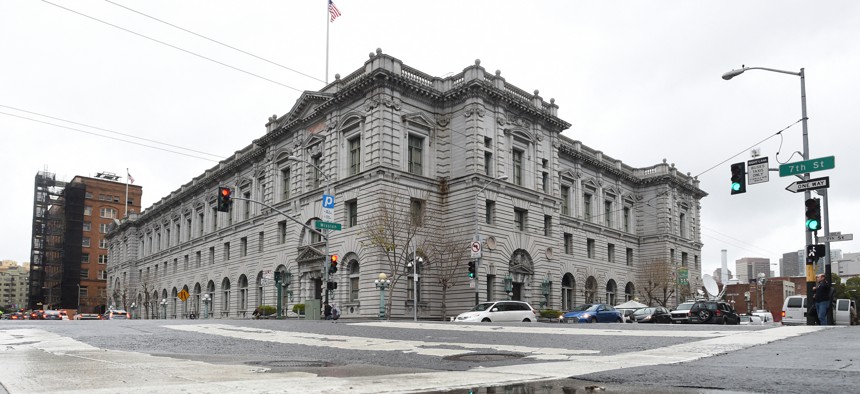
In a court filing Monday, the original three-judge panel announced that the Ninth Circuit Court of Appeals would vote on whether to rehear the case of President Trump’s executive order aimed at stripping two-thirds of the federal workforce of their collective bargaining rights. JOSH EDELSON / Getty Images
Appeals court will reconsider decision to allow Trump’s anti-union order to take effect
The announcement comes as the Trump administration has seemingly reneged on promises to hold off on fully implementing the edict until lawsuits seeking to block the order are complete.
A federal appeals court in California this week signaled that it may revisit a three-judge panel’s decision earlier this month to allow agencies to implement President Trump’s executive order aimed at stripping two-thirds of the federal workforce of their collective bargaining rights.
In a brief court filing Monday in the American Federation of Government Employees’ lawsuit against the Trump administration, the original three-judge panel announced that the Ninth Circuit Court of Appeals would vote on whether to rehear the case with the court’s entire branch presiding.
“A judge of this court has called for a vote to determine whether this case should be reheard en banc,” the three-judge panel wrote. “The parties are directed to file simultaneous briefs setting forth their respective positions on whether the case should be reheard en banc.”
In June, a federal judge in California issued a preliminary injunction blocking federal agencies from implementing a March executive order that cited a seldom-used provision of the 1978 Civil Service Reform Act to exempt most agencies from federal sector labor law, finding that the measure amounted to retaliation against labor groups for protected First Amendment activities like challenging the White House’s workforce policies in court.
But the three-judge panel belayed that decision, concluding that the administration would have taken this course of action, regardless of what actions the labor groups did or did not take, allowing the edict to go into effect while the case proceeds. The panel, comprised of two Trump appointees and an Obama appointee, also based their decision partially on the premise that agencies would stop short of terminating union contracts until the legal challenges had concluded.
“Whatever harm to collective bargaining rights that plaintiffs will experience due to a stay is mitigated by the direction to agencies to refrain from terminating collective bargaining agreements until litigation has concluded,” the judges wrote earlier this month. “Moreover, any terminated agreements can be reinstated if plaintiffs ultimately prevail.”
Since the Ninth Circuit’s original ruling, however, some federal agencies have begun terminating those agreements. On Aug. 13, the Office of Personnel Management retroactively amended its guidance governing implementation of the executive order to allow agencies to cancel collective bargaining agreements against all unions except the National Treasury Employees Union. To date, more than half a dozen agencies have terminated their union contracts, including NTEU’s CBAs with the Health and Human Services Department.
The American Federation of Government Employees and the Trump administration have until Sept. 15 to submit briefs on whether to rehear the case.
Share your news story with us:
Erich Wagner: ewagner@govexec.com; Signal: ewagner.47
NEXT STORY: The State Department laid them off, then it promoted them







